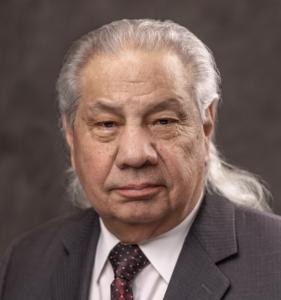SideBar podcast on The Legal Talk Network welcomes John Echohawk, attorney and executive director of the Native American Rights Fund (NARF). Echohawk was the first graduate of the University of New Mexico’s special program to train Indian lawyers and was a founding member of the American Indian Law Students Association. He has been with NARF since its inception in 1970 and has served continuously as its executive director since 1977.

Cohost Jackie Gardina noted that, “We are so pleased to have a lawyer and community leader of John’s caliber and expertise join us on SideBar. John has been recognized as one of the 100 most influential lawyers in America by the National Law Journal and has received numerous service awards and other recognition for his leadership in the Indian law field including the prestigious 2023 Thurgood Marshall Award from the American Bar Association.”
Since 1970, NARF has provided legal assistance to Native American tribes, organizations, and individuals who otherwise might have gone without adequate representation. NARF has successfully asserted and defended the most important rights of Indians and tribes in hundreds of major cases and has achieved significant results in such critical areas as tribal sovereignty, treaty rights, natural resource protection, voting rights, and Indian education.
Cohost Mitch Winick pointed out that, “Most of us, including most lawyers, have no real appreciation of how the rights of Native Americans and their tribes are addressed through treaties, federal laws, and an entire body of tribal law and tribal courts. John and NARF have been on the front line of developing the complex body of Indian Law and defending Native American rights under those laws.”
NARF has impacted tens of thousands of Native Americans in its work for more than 300 tribes. Some examples of the results include:
• Protecting and establishing the inherent sovereignty of tribes;
• Obtaining official tribal recognition for numerous Indian tribes;
• Helping tribes continue their ancient traditions, by protecting their rights to hunt, fish, and use the water on their lands;
• Upholding Native American religious freedom;
• Assuring the return of remains and burial goods from museums and historical societies for proper and dignified re-burial; and
• Protecting voting rights of Native Americans.
To listen to John Echohawk’s SideBar episode with law deans Jackie Gardina and Mitch Winick, hear previous episodes, read our blog, learn about future guests, and to contact the co-hosts with ideas, comments, or questions, go to www.sidebarmedia.org.
More Stories Like This
Native News Weekly (August 25, 2024): D.C. BriefsUS Presidents in Their Own Words Concerning American Indians
Star-Studded Livestream to Boost Native News Online’s Year-End Campaign
Monday Morning (December 8, 2025): Articles You May Have Missed This Past Weekend
Native News Weekly (December 7, 2025): D.C. Briefs
Help us defend tribal sovereignty.
At Native News Online, our mission is rooted in telling the stories that strengthen sovereignty and uplift Indigenous voices — not just at year’s end, but every single day.
Because of your generosity last year, we were able to keep our reporters on the ground in tribal communities, at national gatherings and in the halls of Congress — covering the issues that matter most to Indian Country: sovereignty, culture, education, health and economic opportunity.
That support sustained us through a tough year in 2025. Now, as we look to the year ahead, we need your help right now to ensure warrior journalism remains strong — reporting that defends tribal sovereignty, amplifies Native truth, and holds power accountable.
 The stakes couldn't be higher. Your support keeps Native voices heard, Native stories told and Native sovereignty defended.
The stakes couldn't be higher. Your support keeps Native voices heard, Native stories told and Native sovereignty defended.
Stand with Warrior Journalism today.
Levi Rickert (Potawatomi), Editor & Publisher

